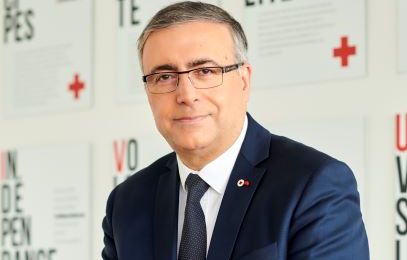A progress report. Almost a year after the start of the conflict, the French Red Cross on Tuesday greeted in a statement the generosity of its donors (individuals, businesses, local authorities), which enabled it to collect more than 100 million euros, injected into humanitarian aid for Ukrainians on site and those who have taken refuge in France.
More than 950,000 emergency kits delivered and approximately 3,000 tons of humanitarian material were delivered by the association in February 2022. For 20 minutesPhilippe Da Costa, President of the French Red Cross, discusses the actions carried out and the operations to come to withstand the shock of this “real long-distance race”.
What is your assessment of your action, nearly a year after the start of the conflict?
We had to react from the first days of the conflict. The majority of people who fled Ukraine for France were at one time or another in contact with the Red Cross. We acted on three levels: welcoming around 100,000 people, in France or elsewhere in Europe. We went to support small national divisions of the Red Cross on the borders of Ukraine, particularly in Moldova, with the installation of a delegation from the French Red Cross, and in Romania.
Finally, the French Red Cross is the first contributor within the movement, in Ukraine. Nearly 90 of the 103 million euros raised were committed to supporting the Ukrainian Red Cross by sending equipment to Lviv. This month, we delivered about fifteen semi-trailers [La Poste et CMA-CGM ont assuré le transport du matériel humanitaire de la Croix-Rouge française en Ukraine].
After the wave of generosity, don’t you fear a drying up of donations?
We witnessed an exceptional outpouring of solidarity, which we compare to what happened in 2004 after the tsunami in Asia. We know that the crisis settles over time, it is one of the main difficulties. But we continue to receive donations which are earmarked for Ukraine. The French are aware that the war is hard, their generosity has allowed us to face this conflict, which has not known an equivalent in humanitarian matters in Europe since the Second World War.
Have the needs of Ukrainians changed since the start of the conflict?
Yes. In the first hours after the invasion, we responded to requests for first aid bags. Then we moved on to emergency food and hygiene kits. Today, we are asked for vehicles. We are also ready to support the distribution of clean water with the Ukrainian Red Cross, we have also received requests related to heating.
About 7.8 million people have fled Ukraine, nearly 6.5 million people have been forced to move within the country. The duration of the conflict raises questions of long-term integration and support for populations who have fled Ukraine, given cultural and linguistic differences.
How are the Ukrainian Red Cross volunteers doing?
I admire the 30,000 volunteers in Ukraine have a capacity for resilience and mobilization. They ensure food distributions, they go into contact in conflict zones. But today, fatigue sets in after a year of war. We deplore dozens of attacks, some volunteers have died, in violation of international humanitarian law. It will be up to the courts and international bodies to draw the necessary conclusions.
How do you manage the influx of Ukrainian refugees in France?
It got a little stale. In the summer, a certain number of them returned to their country. Some have since returned because the situation has deteriorated. Concretely, in France, we have two main missions. First, we act as the interface between the inhabitants who offer accommodation solutions and the authorities.
Then, we equipped 2,400 homes in the summer of 2022 to accommodate refugees, the objective, in 2023, is to manage to equip 2,000 additional ones as part of the installation aid. In Thônes (Haute-Savoie), for example, the town hall has made available a former Ehpad. We transformed it into reception center (French lessons, social follow-up, etc.).
This crisis should help us manage others, because we have made efforts that have made us progress in welcoming exiles. I am thinking today of Turkey and Syria. We have to assume our responsibility for hosting. We cannot afford not to live up to the principles of humanity that characterize us.

